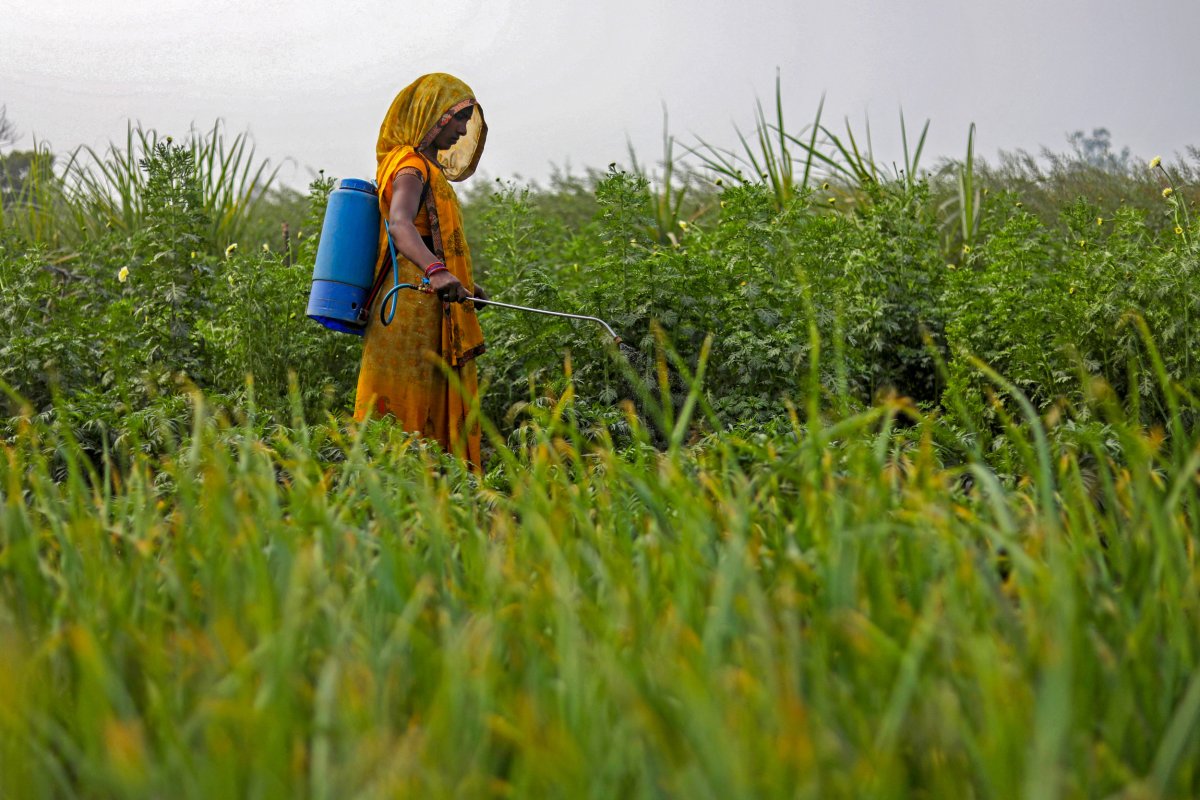Getting your five-a-day has been one of Britain's nutrition benchmarks for decades, but the aim is now turning millions of people into ticking health timebombs.
A recent study from the Environmental Working Group made the startling discovery that a large percent of Americans tested positive for chlormequat, a crop-warping pesticide which is laced through a staggering 92 percent of oat-based foods bought in May 2023 alone.
The poison is barred from food crops in the U.S., but Environmental Protection Agency regulations callously eased during Donald Trump's presidency allowed the import of produce from nations that permit chlormequat use, leaving millions of Americans exposed to its potentially deadly effects.
While chlormequat has not been explicitly found on U.K. cereals, British citizens are still exposed to a cocktail of chemicals each day.
Research showed almost all grapes and oranges in the U.K. contained an array of hazardous pesticides linked to everything from cancers to Parkinson's, infertility, fetal abnormalities, asthma, anxiety, and depression.
And although U.K. politicians promised to maintain European Union (EU) food standards following Brexit, Britain's leaders have failed to ban 36 pesticides barred in Europe—leading to campaigners branding it the "toxic poster child" of Europe, which has also recently ditched plans to slash chemical pesticides by 50 percent by 2030, and prohibit their use in areas including public parks, playgrounds, and schools.
But these U-turns are only revealing one thing: despite repeated scientific and environmental warnings, world leaders are sleepwalking into a pesticide-fueled nightmare. Not only could this threaten health systems like the NHS, but their continued use will also usher in climate change. And it's not like we've had years to change course.
In August 2018, jurors at the Superior Court of California in San Francisco awarded former school groundskeeper Dewayne Johnson $289 million in damages after they ruled his exposure to glyphosate—an active ingredient in the world's most popular weedkiller, Roundup—gave him non-Hodgkin's lymphoma.
Dewayne's was a test case that sparked a mass action against manufacturer Monsanto (now owned by Bayer AG) by tens of thousands of people exposed to pesticides who were later diagnosed with cancer.
As of January this year, Monsanto has paid out around $11 billion in almost 100,000 lawsuits even though Bayer AG still insists glyphosate—the active ingredient in Roundup—is safe.
Their denial has disturbing parallels with the infamous moment when top executives from America's largest tobacco companies testified that they did not believe cigarettes were addictive. However, unlike the rest of the world, which is stalling on monumental moments to ban certain pesticides, my homeland took action in the wake of Dewayne Johnson's landmark case.
Within days of the San Francisco jury ruling, my home country of St Vincent and the Grenadines took the bold step to prohibit glyphosate in a bid to protect our citizens health and promote climate resilience. I am now issuing an urgent rallying cry for similar—and global—action against these poisons.
Change will not come easy.
From the U.K. to the U.S. and EU, there have been years of lobbying against pesticide reduction measures, with manufacturers and Big Agriculture working together to suppress policy change. In the U.S., the chemical industry is spending a record amount to lobby against stronger chemical restrictions—with Dow Chemical being one of Trump's largest inaugural donors.

For the sake of the health of our own and future generations, we cannot let them win.
Luckily, for the first time since its inception, food and agriculture was a major feature of this year's COP summit in Dubai. The UAE Consensus, a lodestar for climate transformation—which also featured a promise to triple renewable energy by 2030 and a groundbreaking deal to transition away from coal, oil, and gas—included a declaration signed by over 130 nations to include food and agriculture in their climate plans.
Specifically, the landmark agreement urged countries to phase out highly hazardous pesticides, reduce pesticide and fertilizer use, and invest into research that adequately understands the harms of continued pesticide use.
But as COP President Dr. Sultan Al Jaber said recently during a meeting at the International Energy Agency in Paris, "We must now turn an unprecedented agreement into unprecedented action and results." He urged governments and industry to fast-track their efforts to transition away from fossil fuels.
In this spirit, world leaders must address the horrific impact of pesticides on biological diversity, habitat loss, and global warming. It's vital the planet unites to invest in research and capacity building—arming our farmers and agricultural sectors with the tools and funding to use non-chemical alternatives while also ensuring national legislation is regularly updated to reflect the latest scientific evidence.
Above all, the world can no longer prioritize the interests of big industry and their shareholders over the warnings of science and the will—and health—of the people.
If we do not reconsider our use of pesticides, we will not only condemn our planet to ecological hell, but open the door to a grim, and very sick future for us all.
Saboto Caesar is the minister of agriculture for St Vincent and the Grenadines as well as an environmental campaigner and lawyer. He has served as junior minister in the Ministry of Agriculture, Forestry and Fisheries; Minister of Housing, Lands and Survey, Physical Planning, Informal Human Settlement and Local Government; Minister of Tourism and Industry—and is currently minister of agriculture, forestry, fisheries and rural transformation, industry & labour. He is an impassioned advocate for the modern medicinal wellness industry and the banning of pesticides.
The views expressed in this article are the writer's own.
Uncommon Knowledge
Newsweek is committed to challenging conventional wisdom and finding connections in the search for common ground.
Newsweek is committed to challenging conventional wisdom and finding connections in the search for common ground.
About the writer
To read how Newsweek uses AI as a newsroom tool, Click here.








